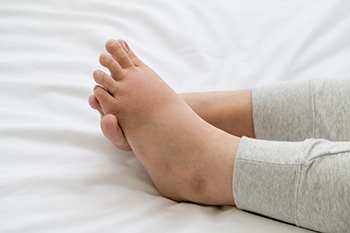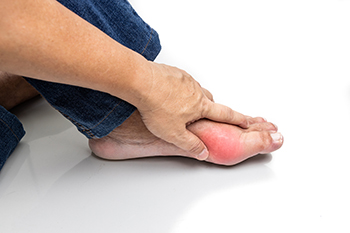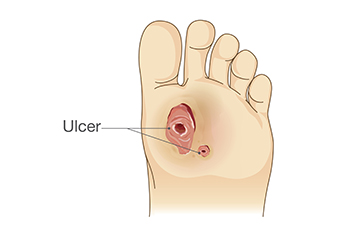Connect With Us
Blog
Items filtered by date: February 2024
Foot Arthritis News

Foot arthritis is a common condition in older adults, but it has not been studied as much as arthritis in the knees or hands. Most studies focus on the big toe joint, but not much is known about arthritis in the middle of the foot. Approximately 17 percent of people over age 50 have foot arthritis that causes symptoms and is visible on X-rays. The big toe joint is usually affected the most, followed by other joints in the foot. There are several types of foot arthritis, including rheumatoid arthritis, osteoarthritis, and gout that require different treatments. Podiatrists may recommend wearing special shoes, custom-made orthotics, and sometimes surgery to help ease pain. If you have chronic foot pain, you may be suffering from a type of arthritis. It is suggested that you schedule an appointment with a podiatrist for an evaluation and determination of what the cause is, followed by obtaining proper treatment.
Arthritis can be a difficult condition to live with. If you are seeking treatment, contact Scott Matthews, DPM, MD from Salem Foot Care . Our doctor can provide the care you need to keep you pain-free and on your feet.
Arthritic Foot Care
Arthritis is a term that is commonly used to describe joint pain. The condition itself can occur to anyone of any age, race, or gender, and there are over 100 types of it. Nevertheless, arthritis is more commonly found in women compared to men, and it is also more prevalent in those who are overweight. The causes of arthritis vary depending on which type of arthritis you have. Osteoarthritis for example, is often caused by injury, while rheumatoid arthritis is caused by a misdirected immune system.
Symptoms
- Swelling
- Pain
- Stiffness
- Decreased Range of Motion
Arthritic symptoms range in severity, and they may come and go. Some symptoms stay the same for several years but could potentially get worse with time. Severe cases of arthritis can prevent its sufferers from performing daily activities and make walking difficult.
Risk Factors
- Occupation – Occupations requiring repetitive knee movements have been linked to osteoarthritis
- Obesity – Excess weight can contribute to osteoarthritis development
- Infection – Microbial agents can infect the joints and trigger arthritis
- Joint Injuries – Damage to joints may lead to osteoarthritis
- Age – Risk increases with age
- Gender –Most types are more common in women
- Genetics – Arthritis can be hereditary
If you suspect your arthritis is affecting your feet, it is crucial that you see a podiatrist immediately. Your doctor will be able to address your specific case and help you decide which treatment method is best for you.
If you have any questions, please feel free to contact our office located in Wikesboro, NC . We offer the newest diagnostic and treatment technologies for all your foot care needs.
Why Does Foot Swelling Occur During Pregnancy?

Foot swelling, or edema, is a common occurrence during pregnancy and can be attributed to various factors. As the body produces more blood and bodily fluids to support the developing fetus, the circulatory system experiences increased pressure, leading to fluid retention in the feet and ankles. Hormonal changes, specifically elevated levels of progesterone, contribute to the relaxation of blood vessels, causing them to dilate and allowing fluid to accumulate in the lower extremities. Additionally, the growing uterus puts pressure on the veins that return blood from the legs to the heart, further impeding circulation and exacerbating swelling. Prolonged standing or sitting, high ambient temperatures, and dietary factors like excessive salt intake can also exacerbate foot swelling at this time. If you are seeking relief options for your swollen feet during pregnancy, it is suggested that you consult a podiatrist who can offer you effective relief techniques.
Pregnant women with swollen feet can be treated with a variety of different methods that are readily available. For more information about other cures for swollen feet during pregnancy, consult with Scott Matthews, DPM, MD from Salem Foot Care . Our doctor will attend to all of your foot and ankle needs.
What Foot Problems Can Arise During Pregnancy?
One problem that can occur is overpronation, which occurs when the arch of the foot flattens and tends to roll inward. This can cause pain and discomfort in your heels while you’re walking or even just standing up, trying to support your baby.
Another problem is edema, or swelling in the extremities. This often affects the feet during pregnancy but tends to occur in the later stages.
How Can I Keep My Feet Healthy During Pregnancy?
- Wearing orthotics can provide extra support for the feet and help distribute weight evenly
- Minimize the amount of time spent walking barefoot
- Wear shoes with good arch support
- Wear shoes that allow for good circulation to the feet
- Elevate feet if you experience swelling
- Massage your feet
- Get regular, light exercise, such as walking, to promote blood circulation to the feet
If you have any questions please feel free to contact our office located in Wikesboro, NC . We offer the newest diagnostic and treatment technologies for all your foot and ankle needs.
Preventing Long-Term Joint Damage From Gout
 Besides the immediate discomfort of gout attacks, continuous and untreated gout attacks leave potential for joint damage. Gout is caused by elevated levels of uric acid in the body. The acid crystallizes and builds up in the joints, leading to painful episodes called gout attacks that often start in the big toe. Recurrent gout attacks can contribute to joint damage and deterioration over time. The repeated inflammatory responses within the joints can erode cartilage, the protective tissue that cushions the joints, and can cause irreversible damage. Untreated gout can also lead to the formation of tophi, lumps of uric acid crystals that accumulate in and around the joints. While usually painless, tophi can cause damage to the bone, pop up above the skin, and become infected. If you have gout or big toe pain, it is suggested you seek the help of a podiatrist who can develop a treatment plan that prevents long-term joint damage and preserves your joint health.
Besides the immediate discomfort of gout attacks, continuous and untreated gout attacks leave potential for joint damage. Gout is caused by elevated levels of uric acid in the body. The acid crystallizes and builds up in the joints, leading to painful episodes called gout attacks that often start in the big toe. Recurrent gout attacks can contribute to joint damage and deterioration over time. The repeated inflammatory responses within the joints can erode cartilage, the protective tissue that cushions the joints, and can cause irreversible damage. Untreated gout can also lead to the formation of tophi, lumps of uric acid crystals that accumulate in and around the joints. While usually painless, tophi can cause damage to the bone, pop up above the skin, and become infected. If you have gout or big toe pain, it is suggested you seek the help of a podiatrist who can develop a treatment plan that prevents long-term joint damage and preserves your joint health.
Gout is a painful condition that can be treated. If you are seeking treatment, contact Scott Matthews, DPM, MD from Salem Foot Care . Our doctor will treat your foot and ankle needs.
What Is Gout?
Gout is a form of arthritis that is characterized by sudden, severe attacks of pain, redness, and tenderness in the joints. The condition usually affects the joint at the base of the big toe. A gout attack can occur at any random time, such as the middle of the night while you are asleep.
Symptoms
- Intense Joint Pain - Usually around the large joint of your big toe, and it most severe within the first four to twelve hours
- Lingering Discomfort - Joint discomfort may last from a few days to a few weeks
- Inflammation and Redness -Affected joints may become swollen, tender, warm and red
- Limited Range of Motion - May experience a decrease in joint mobility
Risk Factors
- Genetics - If family members have gout, you’re more likely to have it
- Medications - Diuretic medications can raise uric acid levels
- Gender/Age - Gout is more common in men until the age of 60. It is believed that estrogen protects women until that point
- Diet - Eating red meat and shellfish increases your risk
- Alcohol - Having more than two alcoholic drinks per day increases your risk
- Obesity - Obese people are at a higher risk for gout
Prior to visiting your podiatrist to receive treatment for gout, there are a few things you should do beforehand. If you have gout you should write down your symptoms--including when they started and how often you experience them, important medical information you may have, and any questions you may have. Writing down these three things will help your podiatrist in assessing your specific situation so that he or she may provide the best route of treatment for you.
If you have any questions, please feel free to contact our office located in Wikesboro, NC . We offer the newest diagnostic and treatment technologies for all your foot care needs.
How Podiatrists Manage Diabetic Feet
 Podiatrists play a vital role in diabetic foot care, offering specialized assistance to prevent foot complications from developing. People with diabetes need to pay close attention to foot care, because high blood sugar can cause damage to nerves and result in poor blood circulation in the feet. When people cannot feel pain in their feet, they may not notice problems such as cuts and ulcers. Wounds are at even higher risk for infection as a result of poor blood flow. Podiatrists help by conducting regular foot exams to identify any issues early on. They also perform neurovascular and musculoskeletal assessments for the feet. Podiatrists educate their patients about proper foot hygiene, nail care, and daily foot checks, as well as recommend suitable footwear to prevent problems. If a patient has foot issues such as calluses, corns, or ingrown toenails, this type of doctor can treat them to prevent the issues from worsening. If you have diabetes and suspect foot problems, it is suggested you consult a podiatrist who can help you manage and prevent foot-related complications due to having diabetes.
Podiatrists play a vital role in diabetic foot care, offering specialized assistance to prevent foot complications from developing. People with diabetes need to pay close attention to foot care, because high blood sugar can cause damage to nerves and result in poor blood circulation in the feet. When people cannot feel pain in their feet, they may not notice problems such as cuts and ulcers. Wounds are at even higher risk for infection as a result of poor blood flow. Podiatrists help by conducting regular foot exams to identify any issues early on. They also perform neurovascular and musculoskeletal assessments for the feet. Podiatrists educate their patients about proper foot hygiene, nail care, and daily foot checks, as well as recommend suitable footwear to prevent problems. If a patient has foot issues such as calluses, corns, or ingrown toenails, this type of doctor can treat them to prevent the issues from worsening. If you have diabetes and suspect foot problems, it is suggested you consult a podiatrist who can help you manage and prevent foot-related complications due to having diabetes.
Diabetic foot care is important in preventing foot ailments such as ulcers. If you are suffering from diabetes or have any other concerns about your feet, contact Scott Matthews, DPM, MD from Salem Foot Care . Our doctor can provide the care you need to keep you pain-free and on your feet.
Diabetic Foot Care
Diabetes affects millions of people every year. The condition can damage blood vessels in many parts of the body, especially the feet. Because of this, taking care of your feet is essential if you have diabetes, and having a podiatrist help monitor your foot health is highly recommended.
The Importance of Caring for Your Feet
- Routinely inspect your feet for bruises or sores.
- Wear socks that fit your feet comfortably.
- Wear comfortable shoes that provide adequate support.
Patients with diabetes should have their doctor monitor their blood levels, as blood sugar levels play such a huge role in diabetic care. Monitoring these levels on a regular basis is highly advised.
It is always best to inform your healthcare professional of any concerns you may have regarding your feet, especially for diabetic patients. Early treatment and routine foot examinations are keys to maintaining proper health, especially because severe complications can arise if proper treatment is not applied.
If you have any questions please feel free to contact our office located in Wikesboro, NC . We offer the newest diagnostic and treatment technologies for all your foot and ankle needs.
Blog Archives
- April 2025
- March 2025
- February 2025
- January 2025
- December 2024
- November 2024
- October 2024
- September 2024
- August 2024
- July 2024
- June 2024
- May 2024
- April 2024
- March 2024
- February 2024
- January 2024
- December 2023
- November 2023
- October 2023
- September 2023
- August 2023
- July 2023
- June 2023
- May 2023
- April 2023
- March 2023
- February 2023
- January 2023
- December 2022
- November 2022
- October 2022
- September 2022
- August 2022
- July 2022
- June 2022
- May 2022
- April 2022
- March 2022
- February 2022
- January 2022
- December 2021
- November 2021
- October 2021
- September 2021
- August 2021
- July 2021
- June 2021
- May 2021
- April 2021
- March 2021
- February 2021
- January 2021
- December 2020
- November 2020
- October 2020
- September 2020
- August 2020
- July 2020
- June 2020
- May 2020
- April 2020
- March 2020
- February 2020
- January 2020
- December 2019
- November 2019
- October 2019
- September 2019
- August 2019
- July 2019
- June 2019
- May 2019
- April 2019
- March 2019
- February 2019
- January 2019
- December 2018
- November 2018
- October 2018
- September 2018
- August 2018
- July 2018
- June 2018
- May 2018
